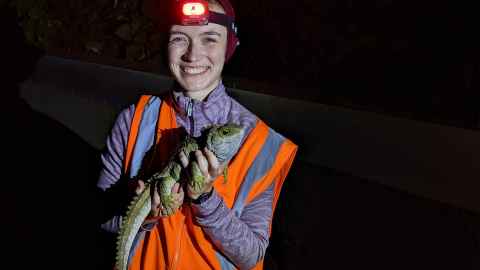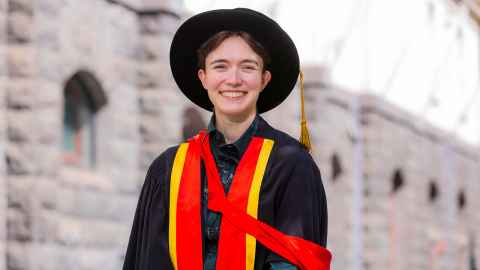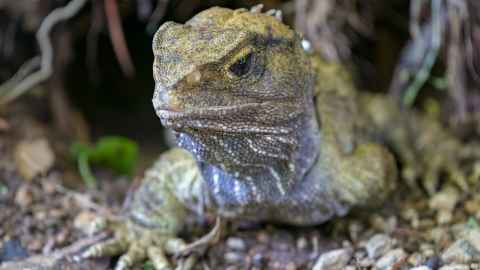Ancient secrets of tuatara unlocked by science grad
11 September 2025
A science PhD graduate had the pleasure and privilege of researching a taonga from the age of the dinosaurs.

US student Cam Hoffbeck, 28, snuck up on tuatara for her PhD in biological sciences.
Venturing to sanctuaries around the country, she took swabs from the ancient creatures for the first study of the tuatara microbiome.
Soon she was a seasoned science communicator – everyone wanted to hear about it. “The outreach been so incredibly rewarding,” says Cam, who’s from Portland, Oregon. “It’s what scientists need to do.”
She graduated on September 10.
The New Zealand chapter of the microbiologist’s story got off to a false start in 2020, when Fulbright scholars were told to return home because of Covid-19. She got back into New Zealand in September 2022.
Microbiologist Professor Mike Taylor and pre-eminent tuatara expert Professor Nicky Nelson, of Victoria University, guided Cam’s work.
What did it show? That the tuatara gut appears to be remarkably stable in the face of disturbances caused by shifts in diet or living conditions. The study offers clues as to how it has survived for millions of years.

New Zealand has been both familiar – there’s a lot in common with Oregon – and an adventure for Cam.
An inspiration for her science communication was a workshop on research impact run by Professors Margaret Stanley and Niki Harre for Ngā Ara Whetū - Centre for Climate, Biodiversity and Society.
Winning the University’s 3MT contest – where students condense their theses to three-minute talks – led to a string of media appearances.
Studying a taonga species and liaising with mana whenua at research sites gave the American a unique insight into te ao Māori. On a personal note, she met her wife-to-be on Tinder during her first stint in the country and they married in July this year.

Now a research fellow at the Auckland University of Technology, she is studying how soil communities can inform regenerating ecosystems, a return to one of her earlier research areas, which have also included marine sponges.
Hilariously for a microbiologist, she’s a germophobe. “First, you’re scared because you don’t know anything, then you get more realistic, but finally you know too much and its scary again.”
A self-confessed workaholic, she’s an energy-filled presence, who channels anxiety into productivity.
“This is the most chill I’ve ever been,” she confides over a long black. “Just think about that!”
She gave a shoutout to her support crew spread over the US and Aotearoa. “I can’t thank everyone enough – friends, family, colleagues, supervisors, iwi, site managers and zookeepers, and most of all my partner.”
Media contact
Paul Panckhurst | Science media adviser
M: 022 032 8475
E: paul.panckhurst@auckland.ac.nz